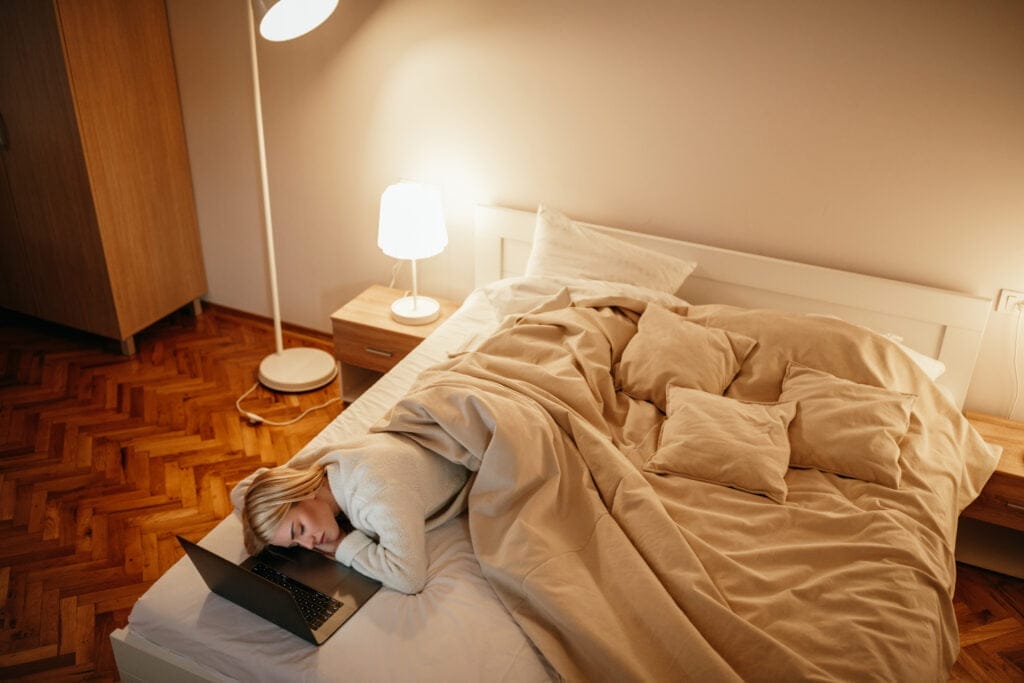Insomnia, a pervasive sleep disorder, can wreak havoc on your life, trapping you in a vicious cycle of sleeplessness and suffering. This article will explore the challenges of insomnia and offer a unique, mindful approach to breaking free from its grip.
A Perpetual Cycle of Struggle
Insomnia is more than just difficulty falling asleep; it’s a relentless cycle that can dominate your life. Picture this: you lie awake at night, your mind racing with random thoughts. The next day, exhaustion sets in, making it challenging to fulfill your responsibilities. Over time, fatigue, sadness, and anxiety build up, potentially leading to burnout. As your mind frantically searches for ways to alleviate these unpleasant feelings, you find yourself wide awake night after night, perpetuating the cycle of insomnia[1].
This self-feeding cycle of suffering makes insomnia particularly challenging to overcome. The impact of insomnia extends far beyond just feeling tired; it can affect your physical health, mental well-being, and overall quality of life. Chronic insomnia has been linked to increased risk of depression, anxiety disorders, and even cardiovascular problems[2]. The persistent lack of quality sleep can impair cognitive function, decrease productivity, and strain relationships.

However, there’s hope on the horizon. By adopting a mindful approach, you can break this cycle of insomnia and improve your sleep quality starting today. It’s essential to understand that overcoming insomnia is not just about following a set of rules or techniques; it’s about changing your relationship with sleep and the thoughts and feelings that surround it.
Unveiling the Hidden Culprits
Before diving into solutions, let’s examine common coping mechanisms that might be exacerbating your insomnia. One major culprit? Social media usage. Take a moment to check your screen time settings. If you’re hesitant to share the results, it might be time for a change.
While many sleep experts advise avoiding screens before bedtime because of blue light exposure, this advice only scratches the surface of the problem. There’s a deeper issue at play: micro-boredom.
Micro-boredom is a subtle yet pervasive feeling we often overlook. Think about the last time you waited in line or sat alone at a restaurant. Chances are, you instinctively reached for your phone or got lost in thought. This reaction stems from discomfort with momentary boredom or social anxiety[3].
During the day, these distractions seem harmless. However, they train your brain to constantly seek entertainment, creating a problem when it’s time to sleep. Those crucial 5-15 minutes needed to drift off become unbearable, leading many to resort to social media or TV as a pre-sleep ritual.

The role of technology in insomnia cannot be overstated. The constant connectivity and stimulation provided by our devices can keep our minds active and alert when we should be winding down. This digital overstimulation contributes significantly to the prevalence of insomnia in our modern society.
But what about those who don’t struggle with micro-boredom yet still battle insomnia? The answer lies in examining the emotions that surface when sleep eludes you. Frustration and anger often dominate, prompting actions like tossing and turning, reading, or reaching for your phone – anything to find comfort.
Insomnia and Mental Health: A Two-Way Street
It’s crucial to recognize the intricate relationship between insomnia and mental health. While insomnia can be a symptom of various mental health conditions, it can also be a contributing factor to their development or exacerbation. This bidirectional relationship makes addressing insomnia even more critical for overall well-being.
For instance, individuals with insomnia are at a higher risk of developing depression and anxiety disorders. Conversely, those with depression or anxiety often experience sleep disturbances, including insomnia, as a symptom of their condition[4]. This interplay can create a challenging cycle where poor sleep and mental health issues reinforce each other.
Understanding this connection is vital in developing a comprehensive approach to managing insomnia. It highlights the importance of addressing not just the physical aspects of sleep, but also the psychological and emotional factors that contribute to sleeplessness.

Mindfulness: The Key to Breaking the Cycle
To truly conquer insomnia, we must change our relationship with these uncomfortable feelings. This is where mindfulness comes into play – but not in the way you might think.
Mindfulness is often misunderstood as simply deep breathing or relaxation techniques. In reality, it’s a philosophy, a systematic approach to internal experiences. The core of mindfulness lies in developing a new relationship with the parts of yourself you typically avoid or dislike[5].
When it comes to insomnia, this means facing the micro-boredom, anger, and frustration head-on instead of trying to eliminate them. It’s not an easy task, which is why it’s rarely discussed in typical sleep advice. Retraining your instinctive responses to these emotions requires effort, but like any skill, it becomes easier with practice.
The practice of mindfulness can be particularly beneficial for those struggling with insomnia. By cultivating awareness of your thoughts and feelings without judgment, you can begin to break the cycle of rumination and anxiety that often accompanies sleeplessness. This approach allows you to observe your insomnia-related thoughts and feelings without getting caught up in them, potentially reducing the stress and frustration that can exacerbate sleep problems.
A Mindful Approach to Better Sleep
Let’s revisit the concept of deep breathing as an example. If you’re using deep breathing to accept uncomfortable feelings as part of your experience, that’s mindfulness. However, if you’re breathing deeply to banish discomfort and seek relaxation, you’re doing the opposite of mindfulness. The context of the action is crucial.
To apply this mindful approach to your insomnia:
- Recognize micro-boredom: When you feel the urge to reach for your phone before bed, pause and acknowledge the feeling of micro-boredom.
- Embrace discomfort: Instead of trying to distract yourself, allow yourself to experience the discomfort of lying awake.
- Observe your emotions: Notice any frustration or anger that arises when you can’t sleep, without trying to change or judge these feelings.
- Practice acceptance: Use techniques like deep breathing not to relax, but to accept that these uncomfortable sensations are part of your current experience.
- Be patient: Remember that changing your relationship with sleep and discomfort takes time and practice.
By adopting this mindful approach, you’re not fighting against insomnia, but rather learning to coexist with the uncomfortable feelings it brings. This shift in perspective can be the key to breaking the cycle of sleeplessness and finding your way back to restful nights.

Incorporating Mindfulness into Your Sleep Routine
To effectively use mindfulness in managing insomnia, consider incorporating these practices into your daily routine:
- Mindful Bedtime Ritual: Create a calming pre-sleep routine that includes mindfulness exercises. This could involve a brief body scan meditation or mindful breathing practice.
- Daytime Mindfulness: Practice mindfulness throughout the day to build your skills. This can help you respond more effectively to stress and anxiety, which often contribute to insomnia.
- Mindful Technology Use: Be conscious of your technology use, especially in the evening. Practice mindful awareness when you feel the urge to check your phone or scroll through social media.
- Acceptance of Wakefulness: If you find yourself awake in the middle of the night, practice accepting this state rather than fighting against it. This can help reduce the anxiety and frustration that often accompany nighttime wakefulness.
- Gratitude Practice: Before bed, take a few moments to reflect on things you’re grateful for. This can help shift your focus away from anxious thoughts that may be contributing to your insomnia.
The Long-Term Benefits of a Mindful Approach to Insomnia
Adopting a mindful approach to managing insomnia can have far-reaching benefits beyond just improving your sleep. By changing your relationship with discomfort and developing greater emotional regulation skills, you may find improvements in various aspects of your life.
Research has shown that mindfulness-based interventions can be effective in reducing the severity of insomnia symptoms and improving overall sleep quality[6]. Moreover, the skills developed through mindfulness practice can help in managing stress, anxiety, and depression – all of which are often intertwined with sleep issues.
It’s important to note that overcoming insomnia through mindfulness is not an overnight process. It requires patience, consistency, and a willingness to sit with discomfort. However, the potential benefits – improved sleep, better emotional regulation, and enhanced overall well-being – make it a worthwhile endeavor.
Conclusion
Insomnia is a complex issue, but by addressing the root causes – our relationship with discomfort and our habitual responses to it – we can pave the way for better sleep. Remember, the path to overcoming insomnia isn’t about forcing sleep, but about changing your relationship with wakefulness.
By embracing a mindful approach to insomnia, you’re not just treating a symptom; you’re developing a new way of relating to your experiences, both comfortable and uncomfortable. This shift can lead to profound changes in your sleep patterns and overall quality of life.
As you embark on this journey to conquer insomnia through mindfulness, be kind to yourself. Progress may be slow, and setbacks are normal. Each night is a new opportunity to practice and grow. With time and consistent effort, you can break free from the cycle of insomnia and rediscover the joy of restful, rejuvenating sleep.
Sweet dreams await on the other side of this mindful journey. By facing your insomnia with awareness and acceptance, you’re taking a powerful step towards better sleep and a more balanced life.
References:
[1] Morin, C. M., & Benca, R. (2012). Chronic insomnia. The Lancet, 379(9821), 1129-1141.
[2] Taylor, D. J., Lichstein, K. L., & Durrence, H. H. (2003). Insomnia as a health risk factor. Behavioral Sleep Medicine, 1(4), 227-247.
[3] Kroese, F. M., Evers, C., Adriaanse, M. A., & de Ridder, D. T. (2016). Bedtime procrastination: A self-regulation perspective on sleep insufficiency in the general population. Journal of Health Psychology, 21(5), 853-862.
[4] Alvaro, P. K., Roberts, R. M., & Harris, J. K. (2013). A systematic review assessing bidirectionality between sleep disturbances, anxiety, and depression. Sleep, 36(7), 1059-1068.
[5] Ong, J. C., Ulmer, C. S., & Manber, R. (2012). Improving sleep with mindfulness and acceptance: A metacognitive model of insomnia. Behaviour Research and Therapy, 50(11), 651-660.
[6] Black, D. S., O’Reilly, G. A., Olmstead, R., Breen, E. C., & Irwin, M. R. (2015). Mindfulness meditation and improvement in sleep quality and daytime impairment among older adults with sleep disturbances: a randomized clinical trial. JAMA Internal Medicine, 175(4), 494-501.




